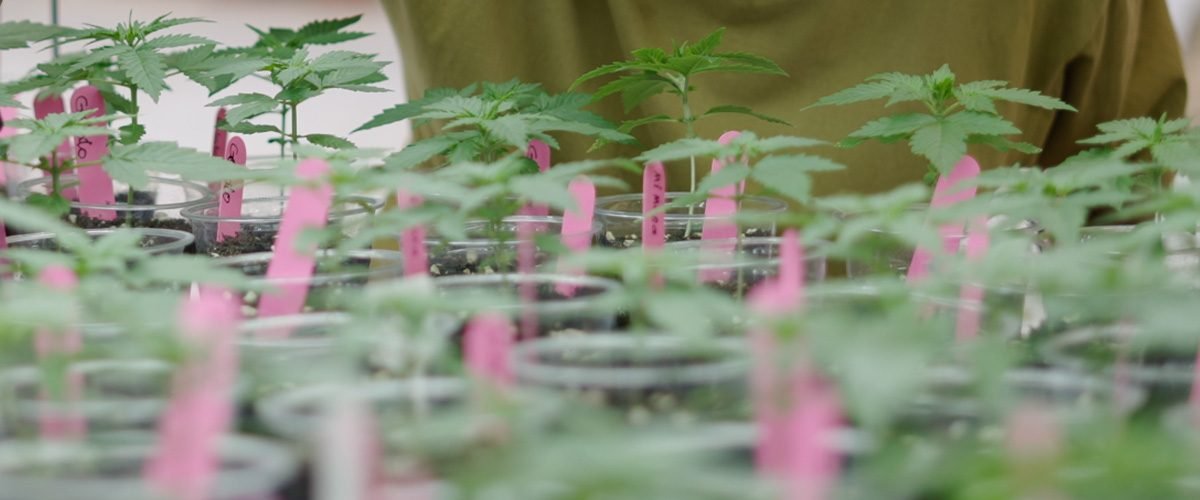We’ve discussed why pH levels are so important for cannabis cultivation. Now let’s talk about how to specifically create the perfect pH environment for cloning. Maintaining a pH level between 5.5 and 6.5 is crucial for successful cloning, as it ensures optimal nutrient uptake and root development. Using pH-adjusted water and carefully monitoring levels throughout the cloning process will help create the ideal environment for healthy plant growth.
By monitoring and adjusting the levels of pH for cloning cannabis, growers can prevent nutrient deficiencies and ensure they have the best possible environment for root development. With the right pH balance, growers can expect healthier, more resilient plants that will thrive throughout their growth cycle. Ultimately, consistent attention to pH levels can make a significant difference in the success of a cannabis cultivation operation.
Why is 5.5 – 6.5 pH The Ideal Range For Cannabis Clones?
It is crucial to monitor pH levels closely and make necessary adjustments to create an optimal growing environment for successful cultivation. We will explore the importance of achieving the right pH for cloning cannabis, different growing mediums, various water sources, the consequences of incorrect pH levels, and viable strategies for preserving the perfect pH. By understanding the importance of pH levels in cloning, growers can make informed decisions that will ultimately lead to higher yields and better quality plants.
Importance Of Monitoring & Adjusting The pH For Cloning Cannabis Plants
Consistent monitoring and adjustments of pH levels are crucial during the entire cloning process to ensure optimal conditions for root development and plant growth. From preparing the rooting medium to transplanting rooted clones into larger containers, maintaining a balanced pH level is essential for the overall success of the cloning process. Failure to monitor and adjust pH for cloning cannabis can result in a variety of negative impacts. These include stunted growth, nutrient deficiencies, and poor root development, ultimately affecting the health and vitality of the plants. We will discuss this in more detail later on in this article.
During the preparation of the rooting medium, it is important to test and adjust the pH levels to create an environment that is conducive to root growth. This will help ensure that the clones have access to essential nutrients and minerals needed for healthy development. As the clones continue to grow and are eventually transplanted into larger containers, consistent monitoring and adjustments of pH levels will help support their ongoing growth and vitality. By paying close attention to pH levels throughout the cloning process, growers can maximize their success rate and produce strong, healthy plants.
Different Growing Mediums Require Different pH Levels For Cloning
Rockwool cubes usually have a pH of 8.0 which isn’t optimal for growing plants, however, when adjusted accordingly, they provide an optimal environment. Due to their ability to retain moisture and provide good aeration for developing roots, rockwool cubes are a popular choice for cloning. While the ideal pH for cloning cannabis is 5.5 – 6.5, rockwool cubes will specifically be on the lower end of that range. At around 5.5-5.8, rockwool cubes will thrive. This range allows for optimal nutrient uptake and root growth, and allow the high pH of rockwool to remain at your ideal range.
Coco coir is another common growing medium used for cloning, known for its ability to retain moisture while still providing good drainage. Unlike rockwool, coco coir has a natural pH level, between 5.7 – 6.5. The ideal pH level for coco coir is slightly higher than rockwool, around 6.0-6.5. Maintaining this range will ensure that nutrients are readily available to the developing clones. Fortunately, your medium is already at an ideal pH range.
For growers using dirt or soil as a growing medium for cloning, it’s important to maintain a higher pH level, somewhere between 6.0 and 7.0. The higher range allows the clones to access essential nutrients in the soil while also preventing nutrient deficiencies or toxicities that can hinder their growth. However, remember, you should stay in a range of 5.5 – 6.5 for cloning. Soil may not be your best option for cloning, as it can be difficult to control the pH levels within this optimal range. Using soil as a substrate may also not provide enough drainage to the roots for successful cloning.
By choosing the right growing medium and monitoring pH levels closely, growers can ensure successful cloning and produce healthy plants ready for transplanting into larger containers. By understanding the different pH levels required for each growing medium, growers can ensure that their clones receive the necessary nutrients to thrive and grow into strong, healthy plants.
Different Sources Of Water Will Contain Varying pH Levels
Different sources of water, such as tap water, well water, rainwater, or distilled water, may have varying pH levels that can impact plant growth, so it’s important to test and adjust accordingly to ensure a healthy environment for your plants.
Testing the pH of your water source is crucial in order to determine if any adjustments need to be made. Although tap water quality varies globally, a pH of 6.5 to 8.5 is generally considered adequate. While well water is normally fresher, it is typically already packed with nutrients, and high in minerals. Well water can have a pH range that varies greatly, and it may require additional adjustments to create an optimal environment for your plants.
Similarly, the pH of rain can also be very inconsistent; however, it tends to hit on the lower range of the pH range. A typical clean rain has a pH often between 5.0 and 5.5, making it somewhat acidic. Pollutants from vehicles and power plants, such as sulfur dioxide and nitrogen oxides, make rain much more acidic. The usual pH of acid rain is 4.0. Acidic rain can have detrimental effects on plants, so it is crucial to monitor and adjust pH levels accordingly.
Using reverse osmosis water or distilled water can also help maintain a consistent pH level for optimal plant growth. The water generated by reverse osmosis technique usually has a pH range of 6.0 – 6.5. Distilled water has a neutral pH of 7. By using reverse osmosis water or distilled water, you can have more control over the pH levels and provide a consistent and healthy growing environment for your plants.
If you are using tap water, well water, or rain water, we suggest leaving it out to oxidize for at least 24-hours. This will allow any chlorine or other chemicals to dissipate before adjusting the pH levels for cloning purposes.
Negative Impact Of Improper pH Levels On Cloning Success
Improper pH levels can have a significant impact on cloning success. When the pH of the water used for cloning is not within the optimal range, nutrient deficiencies can occur. This can result in weak and unhealthy clones that struggle to develop properly. Stunted growth is also a common issue associated with improper pH levels, as essential nutrients may not be readily available for uptake by the plants.
When the pH of the water used for cloning is too high or too low, it can disrupt the balance of essential nutrients needed for root development. Specifically, a pH that is too high can lead to a deficiency in iron, manganese, and zinc, which are crucial for root growth. On the other hand, a pH that is too low can limit the availability of phosphorus and potassium, which are essential for root formation and overall plant health.
These nutrient imbalances can result in poor root development, weak root systems, and ultimately hinder the success of cloning efforts. It is important to closely monitor and adjust the pH levels of the water source to ensure optimal conditions for healthy root development during cloning.
Furthermore, plants with incorrect pH levels are more susceptible to diseases and pests. When the pH is too high or too low, it can create an environment where harmful pathogens thrive, leading to increased risk of infections and infestations. Clones that are already weakened due to improper pH levels are less able to defend themselves against these threats, making them even more vulnerable to damage.
How To Get A Level Of 5.5 – 6.5 pH For Cloning Cannabis
pH levels are crucial for cannabis cultivation, especially during cloning, as they ensure optimal nutrient uptake and root development. To achieve a pH level between 5.5 and 6.5, you can use pH testing kits or meters to regularly check and adjust the water or nutrient solution accordingly. Additionally, incorporating pH buffers or adjusting agents can help stabilize and maintain the desired pH range for optimal cloning success.
It is important to regularly monitor pH levels in water to ensure they remain within the optimal range. One common method is using pH up or down solutions, which are specifically formulated to raise or lower the pH of water. Natural additives like lemon juice or vinegar can also be used to adjust pH levels, although they may not be as precise as commercial products.
For more accurate and consistent results, specialized equipment like pH meters can be utilized to monitor and adjust the pH of water with precision. Each method has its own advantages and limitations, so it’s important to choose the one that best suits your needs and preferences. You can learn more about different pH adjustment solutions here.
Tips Dealing With Common Issues Of pH For Cloning Cannabis
It is important to ensure that each clone receives an equal amount of water to maintain consistent pH levels throughout the entire process. Inconsistent watering practices are a common cause of pH level fluctuations in cloning environments. To address this, growers can implement a regular watering schedule and use pH-balanced water to maintain stable levels. Additionally, using pH testing kits or meters can help accurately monitor and adjust pH levels as needed.
Another common issue is nutrient imbalances that can affect pH levels. Growers can prevent this by using well-balanced nutrient solutions specifically designed for cloning stages. Regularly checking the nutrient solution’s pH and adjusting it accordingly will help ensure that the clones receive the proper balance of nutrients for optimal growth. By addressing these common issues proactively, growers can create a more stable and conducive environment for healthy root development. Ultimately leading to healthier and more vigorous plants.
5.5 – 6.5 pH For Cloning Cannabis Is Essential
Optimal pH levels are essential for cannabis cultivation, especially while cloning. It is crucial to keep the pH levels within the range of 5.5 to 6.5 for the best nutrient absorption and root growth. Maintaining proper pH levels in the nutrient solution is key to successful cloning and overall plant health.
In order to ensure successful cloning, it is crucial to carefully monitor and adjust the pH levels of the water used in the process. Using a consistent pH for cloning cannabis within a range of 5.5 – 6.5 can help promote healthy root development and overall plant growth. This attention to detail will not only improve your cloning success rate but also contribute to the long-term health and vitality of your plants.





